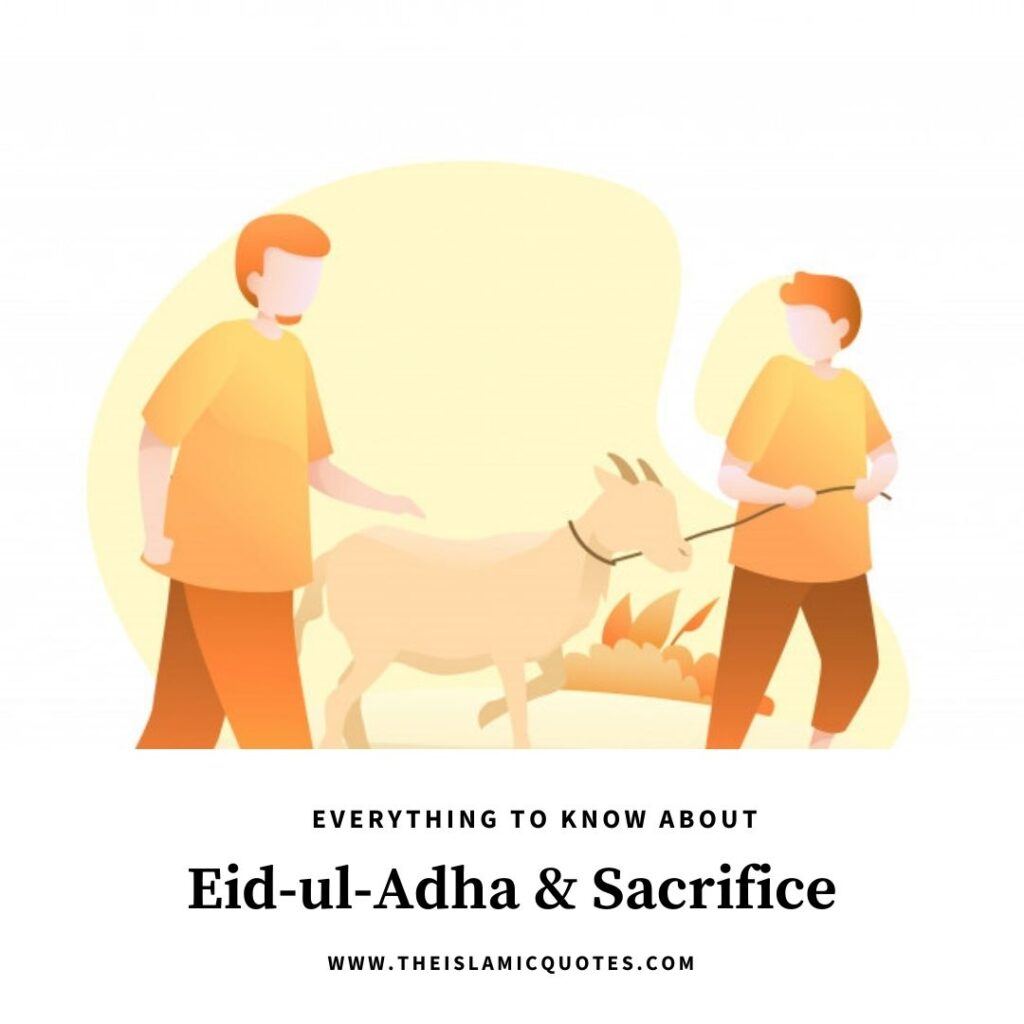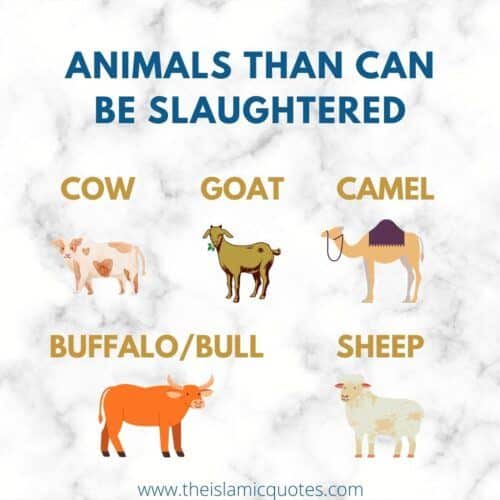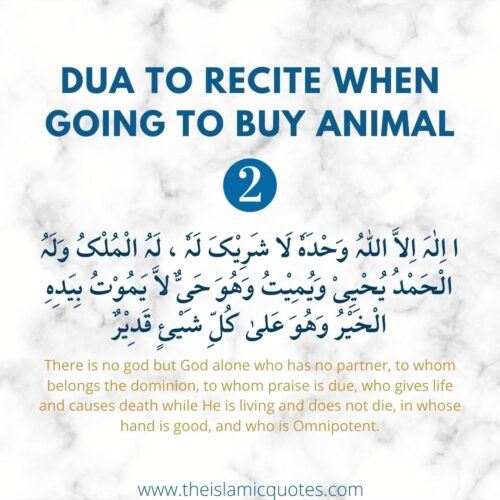Eid ul Adha is just around the corner. And so is all the buzz and frenzy of the sacrificial animals. After all, sacrifice is the hallmark of this religious festival, right?
Whether or not you are sacrificing an animal this year, as a Muslim it is impossible to spend the month of Zil Hajj without the talk of sacrifice! There are many questions that pop up in our minds regarding this essential worship.
Significance of Eid Ul Adha for Muslims
Thus, in this article, we will be looking at sacrifice from all the various aspects, from its essence to its rulings. Come along and take the tide of knowledge with us to enable yourself and others to better perform this holy practice.

12. What is the meaning of Eid ul Adha?
The term that comes in Arabic for sacrifice is ‘Udhiyaa.’ This is the same term from which the name of this Eid, Eid-ul-Adhaa is derived.
Udhiyaa refers to the sacrifice or sacrificial animals. In the subcontinent, it is commonly referred to as Qurbani.
11. The Philosophy of Sacrifice and the Story of Prophet Ibrahim (AS)
Why did Allah SWT make Sacrifice obligatory upon Muslims? What is the wisdom behind it?
To understand this, we can take a look at the historical event behind this obligation.
As is known to most Muslims, it is Prophet Ibrahim (AS) story that forms much of the background behind this holy ritual.
Allah SWT commanded the Prophet Ibrahim to sacrifice his most beloved thing in this world for the sake of Allah SWT. The Prophet Ibrahim AS knew it was his son that was most beloved to him in this temporary abode. Thereby, he talked to his son, who readily agreed, and they both thus made arrangements for sacrifice.
What happened next is popular. Allah SWT, with his infinite power and qudrah, replaced the son with a lamb, and eventually it was the lamb that bled and was sacrificed.
One would wonder what Allah SWT wanted from his beloved slave, Ibrahim (AS) in this incident? Did Allah SWT want his son? If that is so, then why was he replaced with a lamb?
The hidden wisdom behind this is the fact that Allah SWT tested Prophet Ibrahim AS to see that what is more beloved to him; his son or the command of Allah? Would he be ready to sacrifice his son for his Lord, the same Lord who has the might and power to bring his son back alive anyhow?
And, needless to say, but important to remember, Prophet Ibrahim (AS) passed the test in flying colours.
Thus, there is immense wisdom behind the act of sacrifice in the month of Zil Hajj. For one, it is to commemorate Prophet Ibrahim (AS)’s remarkable victory in this insurmountable test. Second, it is for us to learn from Prophet Ibrahim (AS)’s legacy that whenever the time comes to choose between Allah’s commandment and any other thing, be it our wealth, money, family, nafs, or even our life, we should always give preference to Allah’s commandment and should always be willing to ‘sacrifice’ whatever is at the opposing end.
We all know that we are sent into this world to be tested. The test is all about whether or not we believe in Allah SWT as our true Lord and live up to that belief. A manifestation of our unwavering belief in Him is our ability to sacrifice everything that comes in opposition with the desire and command of our Lord. This is the true essence of being an ‘Abd of Allah SWT.
Hence, through our ritual sacrificial practise each year, we learn to become this true definition of Abd, we learn to sacrifice everything for the sake of Allah SWT, starting from a simple animal.

10. The Virtues of Qurbani/Sacrifice
Take a look at the following Ahadith that speak about the virtue of sacrifice.



From this, we learn that there is great reward and virtue in sacrificing for the sake of Allah SWT with contentment, happiness and willingness.
This means that Allah SWT doesn’t want from us a cultural sacrifice, or one done out of societal pressure or sacrifice done for the sake of sacrifice. Rather, Prophet Mohammad has encouraged Muslims to sacrifice wholeheartedly for the sake of Allah SWT with the hope for reward. Here are some more Sunnahs To Follow On Eid Day & Night.
As Muslims, we should always be willing to sacrifice everything and anything for Allah without the fear of losing anything. Because, remember, we believe that Allah SWT Himself is the sole provider for all our blessings. Then, if we are to sacrifice blessings given by Him for His sake and His pleasure, is it possible that we would become bankrupt? Absolutely not!
When someone makes us happy, we feel like giving them more. So, what shall we say about Al-Mannan (the Giver of gifts without asking or deserving)? When we spend and sacrifice in the way of our Lord, He grants us more and more.
9. Upon Whom is Qurbani Obligatory?
Sacrifice, or Udhiyaa, is obligatory upon every Muslim who fulfils the following criteria:
- Mature (has reached puberty)
- Sane
- Resident (not a traveler by Shariah law)
- Wealthy
By wealthy, we mean a person who possesses wealth equal to the nisaab of Sadqatul Fitr. What is the nisaab of Saqdatul Fitr? It is for a person to possess 7.5 tola gold or 52.5 tola silver or cash or trading assets or possessions beyond need that are equivalent in value to either 7.5 tola gold or 52.5 tola silver.
That’s 5 things. Gold, silver, cash, trading assets or possessions beyond need. The first four are pretty obvious.
Possessions beyond need refer to all those things that a person possess that are not from the basic necessities of life. These include TV, dispenser, microwave, etc.
Even from the basic necessities such as clothes, transport vehicle, basic furniture, if one possesses them in excess quantity, more than what is needed for decent survival, that would also make one wealthy if the total value reaches the value of 52.5 tola silver.
For example, extra clothes, stitched or unstitched that are not in current use and not expected to be used in the near future, extra transport vehicles, decoration items, etc.
If a Muslim fulfills all the four above-mentioned conditions, then it is obligatory on him to make the ritual sacrifice on Eid-ul-Adha. You can learn more about the concept of nisab from our previous post on Zakat In Islam.

8. Is It Necessary to Wait for a Year to Pass on This Wealth to Be Eligible For Sacrifice?
Reading this, you might have noticed that this is pretty much similar to the rulings of Zakah. While that is true, however, the difference lies in the fact that for Sacrifice to be obligatory, the passing of a year is not a condition.
This means that if someone becomes wealthy on the day of Eid or even till before the Maghrib of the 3rd day of Eid (12th Zil Hajj), sacrifice will become obligatory on him.
7. Which Animals Can Be Used for Sacrifice?
Qurbani is permissible with the following animals: goats, sheep, bulls, buffaloes and camels. Whether they are male or female or castrated, all can be used for sacrifice.
Apart from these other animals such as chicken or deer etc. can not be used for sacrifice, though they may be halal.

The Age of Sacrificial Animals
The animals that are to be sacrificed ought to be of a certain age.
- Goats and sheep ought to be at least a year old. Goats less than a year will not be permissible. However, if a sheep which is less than a year old is such fat and healthy that it resembles a year-old sheeps in a way that if it were placed with a one-year old sheep, it would be difficult for one to distinguish between their ages, in such a case a sheep younger than a year old may be used for sacrifice. However, it cannot be less than six-months old in any case.
- Bulls, cows and buffaloes have to be at least 2 years old.
- Camels have to be at least 5 years old.
Details Regarding Shares in Animals
Is it possible to contribute and buy a sacrificial animal? Well, in some cases, yes.
A goat or a sheep is considered a small animal. So, shares or contributions are not permissible in them. This means that if a person intends to sacrifice a sheep or a goat, one goal will only suffice for one person.
Sacrificing one goal to fulfil the obligation or two or more people is not permissible or possible.
However, with cows, bulls, buffaloes and camels, there are seven parts in each. Thus, 7 people can contribute and buy these animals and sacrifice them.
More than seven is not permissible. However, it is possible that one person takes 3 parts, and another takes 4 parts.
What I mean is that the maximum shares in a big animal is seven. If a person has a share less than the seventh of the animal, the sacrifice won’t be valid. The seven shares however, can be divided among however many people in whatever ratio. The only condition is that the total shouldn’t go above seven, or an individual share should not go less than 1/7th.
6. What to Look For in an Animal When Buying It for Eid Ul Adha?
The Shariah has advised and recommended Muslims to buy a sacrificial animal that is excellent, healthy and free of defects. Thus, there are some defects that one must watch out for when buying an animal. These are:
- An animal that is blind or more than a third of its sight is lost
- An animal which has more than a third of its ear or tail cut off
- A lame animal which walks on three feet
- An animal that is frail to an extent that its meat and bones cannot be used for qurbani
- An animal that has no teeth at all
- An animal born without ears
- An animal whose horns have been removed from the roots (an animal born without horn or has broken horn is permissible)
One must always remember that this animal is going to be presented to the Lord of the Universe, to Allah SWT. Think about how perfect is our Creator, so how perfect should be the thing we put forth for His pleasure!
5. What Is the Time of Sacrifice on Eid ul Adha?
The time of sacrifice commences from the day of Eid-ul-Adha i.e. the 10th of Zil Hajj, till the 12th of Zil Hajj.
However, on the 1st day, sacrifice is only permissible after the Eid Salah. And on the 3rd day, it is allowed only up till the maghrib of the 13th Zil Hajj. After maghrib and before the Eid Salah, sacrifice would not be permissible and would be null and void if done.
Though all 3 days are permissible, it is best to make the sacrifice on the first day of Eid. The second day is the second best and so on.
Moreover, sacrifice can be made at any time during the day or night. However, it is better to make in daylight so as to ensure that all required veins are cut properly and none is left out, as this would nullify the sacrifice.
4. The Method of Sacrificing
It is best if the person on whom the sacrifice is waajib makes it with his own hands. However, one can appoint someone else to make the sacrifice for him. In that case, the person should be present at the time of slaughter.
Making a verbal intention isn’t necessary. If one has the intention in his heart that he is sacrificing this animal for the sake of Allah SWT, then that would be enough.
The brief method of Sacrifice is as follows:
- Place the animal in the direction of Qibla. This is preferred, not obligatory
- Keep the knife sharp and slaughter it while taking the name of Allah
- Make every possible effort to not hurt the animal in anyway beyond the slaughter
- Wait for the animal to become cold before taking off its skin and dissociating the neck
The Prophet also advised that the knife not be sharpened in front of the animal as it causes the animal pain. It is like killing the animal twice.
It is important to take the name of Allah while slaughtering an animal for that animal to be halal as food. However, if a person forgets to take the name of Allah, it will still be halal. But, if he intentionally does not recite it, then the meat of that animal would not be halal for consumption.
3. Rulings Regarding the Meat of the Sacrificial Animal
As far as the meat of the sacrificial animal is concerned, the best way to go about it is to divide the meat in 3 equal parts; one for ownself, one for friends and relatives and one part for the poor and needy.
It is permissible to give the meat to a non-Muslim as well. Giving away at least 1/3rd in charity is recommended. However, remember that it is not an obligation.
The meat can be distributed however one likes. One can even keep the entire meat for himself. That is permissible.
Although Islam has encouraged us to earn more and more rewards through a single act. Giving to friends and relatives earns one the rewards of 1. Giving a gift, 2. Maintaining ties of kinship. With giving the poor, one gets the reward of charity too. Thus, the best way to distribute the meat is the three-part method mentioned above.
2. Duas regarding Sacrifice on Eid ul Adha



1. Is It Permissible to Make Qurbani on Behalf of Someone?
There can be three situations in this regard. The rulings of each are as follows:
On Behalf of Someone Not Present
It is permissible to make sacrifices on behalf of someone who’s not present, for example, a person living in Pakistan makes the Qurbani on behalf of his brother in the UK.
However, the important thing is the permission of the person on behalf of whom the qurbani is being made. If the sacrifice is made without his permission, then the sacrifice will not be valid.
On Behalf of Someone Present
Suppose sacrifice is Waajih upon a man and his wife. In this case, each of them are required to make their own sacrifice because Qurbani is only waajib on one’s own behalf. Nobody is liable to fulfil this obligation on behalf of someone else.
If the wife appoints her husband to make the sacrifice on her behalf, then it will be valid. But, if the husband does it himself without taking permission from the wife, then the wife’s sacrificial duty would not be completed. Again, permission is crucial here.
On Behalf of a Dead Person
It is permissible to make a sacrifice on behalf of a dead person with the intention that the reward reaches them. Making a sacrifice on behalf of one’s death, parents of relatives or the beloved Prophet is recommended if one can afford.
However, one must remember that this gift Qurbani cannot be combined with one’s Wajib Qurbani. This means that one cannot make the intention of a gift Qurbani in his own Qurbani. He would have to take a separate animal or part of a big animal to sacrifice on behalf of the deceased.
Concluding Remarks
And, that’s about it! All the essential information about sacrifice in one place.
Eid-ul-Adha is a time to earn great rewards, so let us all make a firm intention to not miss this golden opportunity to make our scales of good deeds all the heavier!

